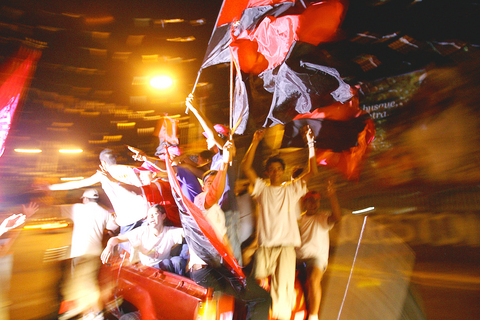Sandinista leader Daniel Ortega had a strong lead over four other candidates in an election that could return him to power 16 years after a US-backed rebellion helped force him from office, according to preliminary results released early yesterday.
With a little over 7 percent of polling stations counted, Ortega has 41 percent, to 33 percent for Harvard-educated Eduardo Montealegre of the Nicaraguan Liberal Alliance, a party that broke from the ruling Constitutionalist Liberal Party after former president Arnoldo Aleman was convicted of corruption.
Trailing behind were Sandinista dissident Edmundo Jarquin, ruling party candidate Jose Rizo and former Contra rebel Eden Pastora.

PHOTO: AFP
Ortega needs 35 percent of the vote and an advantage of 5 percentage points over his closest rival to avoid a runoff next month.
Sunday's election has become a tug-of-war issue between Venezuela and the US. Venezuelan President Hugo Chavez has openly favored his "brother" Ortega, while Washington remains wary of the balding 60-year-old, once an iconic figure of the Latin American left and ally of the Soviet Union.
The US Embassy issued a statement late on Sunday saying it was too soon to "make an overall judgment on the fairness and transparency of the process."
"We are receiving reports of some anomalies in the electoral process, including the late opening of [polling places], the slowness of the voting process and the premature closing of some" polling places, the statement read.
Before reading the early results, Roberto Rivas, president of the Supreme Electoral Council, blasted the US statement, saying: "We have promised the Nicaraguan people transparent elections, and that's what we've done. I think there were enough observers to witness that."
Ortega's supporters flooded the streets, setting off celebratory fireworks, waving the party's red-and-black flag and swaying to the candidate's campaign song, set to the tune of John Lennon's Give Peace a Chance.
Montealegre brushed aside Ortega's lead, saying: "This doesn't show anything."
Constitutionalist Liberal Party spokesman Leonel Teller warned that electoral authorities were "inciting something that could end in blood and violence."
Observers said voting overall was peaceful, although many polling stations opened late, leaving long lines of people waiting to cast their ballots. After the polls closed, groups of angry voters pounded on shuttered doors, screaming at officials inside to let them vote.
Polls have shown Ortega would have trouble winning a runoff. While he has a loyal base of support, many voters still have bitter memories of Sandinista rule, which left the country in an economic shambles and which saw 30,000 killed in a war against US-backed Contra rebels.
Ortega has repeatedly said he has changed.

VAGUE: The criteria of the amnesty remain unclear, but it would cover political violence from 1999 to today, and those convicted of murder or drug trafficking would not qualify Venezuelan Acting President Delcy Rodriguez on Friday announced an amnesty bill that could lead to the release of hundreds of prisoners, including opposition leaders, journalists and human rights activists detained for political reasons. The measure had long been sought by the US-backed opposition. It is the latest concession Rodriguez has made since taking the reins of the country on Jan. 3 after the brazen seizure of then-Venezuelan president Nicolas Maduro. Rodriguez told a gathering of justices, magistrates, ministers, military brass and other government leaders that the ruling party-controlled Venezuelan National Assembly would take up the bill with urgency. Rodriguez also announced the shutdown

Civil society leaders and members of a left-wing coalition yesterday filed impeachment complaints against Philippine Vice President Sara Duterte, restarting a process sidelined by the Supreme Court last year. Both cases accuse Duterte of misusing public funds during her term as education secretary, while one revives allegations that she threatened to assassinate former ally Philippine President Ferdinand Marcos Jr. The filings come on the same day that a committee in the House of Representatives was to begin hearings into impeachment complaints against Marcos, accused of corruption tied to a spiraling scandal over bogus flood control projects. Under the constitution, an impeachment by the

Exiled Tibetans began a unique global election yesterday for a government representing a homeland many have never seen, as part of a democratic exercise voters say carries great weight. From red-robed Buddhist monks in the snowy Himalayas, to political exiles in megacities across South Asia, to refugees in Australia, Europe and North America, voting takes place in 27 countries — but not China. “Elections ... show that the struggle for Tibet’s freedom and independence continues from generation to generation,” said candidate Gyaltsen Chokye, 33, who is based in the Indian hill-town of Dharamsala, headquarters of the government-in-exile, the Central Tibetan Administration (CTA). It

A Virginia man having an affair with the family’s Brazilian au pair on Monday was found guilty of murdering his wife and another man that prosecutors say was lured to the house as a fall guy. Brendan Banfield, a former Internal Revenue Service law enforcement officer, told police he came across Joseph Ryan attacking his wife, Christine Banfield, with a knife on the morning of Feb. 24, 2023. He shot Ryan and then Juliana Magalhaes, the au pair, shot him, too, but officials argued in court that the story was too good to be true, telling jurors that Brendan Banfield set